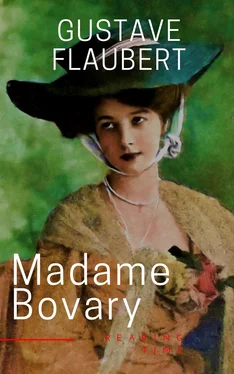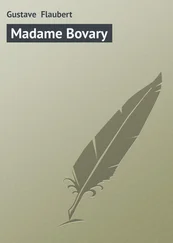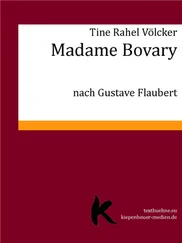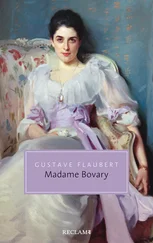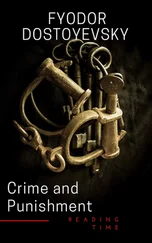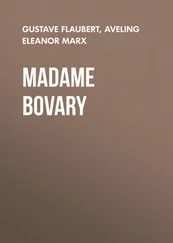She sat down again and took up her work, a white cotton stocking she was darning. She worked with her head bent down; she did not speak, nor did Charles. The air coming in under the door blew a little dust over the flags; he watched it drift along, and heard nothing but the throbbing in his head and the faint clucking of a hen that had laid an egg in the yard. Emma from time to time cooled her cheeks with the palms of her hands, and cooled these again on the knobs of the huge fire-dogs.
She complained of suffering since the beginning of the season from giddiness; she asked if sea-baths would do her any good; she began talking of her convent, Charles of his school; words came to them. They went up into her bedroom. She showed him her old music-books, the little prizes she had won, and the oak-leaf crowns, left at the bottom of a cupboard. She spoke to him, too, of her mother, of the country, and even showed him the bed in the garden where, on the first Friday of every month, she gathered flowers to put on her mother's tomb. But the gardener they had never knew anything about it; servants are so stupid! She would have dearly liked, if only for the winter, to live in town, although the length of the fine days made the country perhaps even more wearisome in the summer. And, according to what she was saying, her voice was clear, sharp, or, on a sudden all languor, drawn out in modulations that ended almost in murmurs as she spoke to herself, now joyous, opening big naive eyes, then with her eyelids half closed, her look full of boredom, her thoughts wandering.
Going home at night, Charles went over her words one by one, trying to recall them, to fill out their sense, that he might piece out the life she had lived before he knew her. But he never saw her in his thoughts other than he had seen her the first time, or as he had just left her. Then he asked himself what would become of her—if she would be married, and to whom! Alas! Old Rouault was rich, and she!—so beautiful! But Emma's face always rose before his eyes, and a monotone, like the humming of a top, sounded in his ears, "If you should marry after all! If you should marry!" At night he could not sleep; his throat was parched; he was athirst. He got up to drink from the water-bottle and opened the window. The night was covered with stars, a warm wind blowing in the distance; the dogs were barking. He turned his head towards the Bertaux.
Thinking that, after all, he should lose nothing, Charles promised himself to ask her in marriage as soon as occasion offered, but each time such occasion did offer the fear of not finding the right words sealed his lips.
Old Rouault would not have been sorry to be rid of his daughter, who was of no use to him in the house. In his heart he excused her, thinking her too clever for farming, a calling under the ban of Heaven, since one never saw a millionaire in it. Far from having made a fortune by it, the good man was losing every year; for if he was good in bargaining, in which he enjoyed the dodges of the trade, on the other hand, agriculture properly so called, and the internal management of the farm, suited him less than most people. He did not willingly take his hands out of his pockets, and did not spare expense in all that concerned himself, liking to eat well, to have good fires, and to sleep well. He liked old cider, underdone legs of mutton, glorias* well beaten up. He took his meals in the kitchen alone, opposite the fire, on a little table brought to him all ready laid as on the stage.
*A mixture of coffee and spirits.
When, therefore, he perceived that Charles's cheeks grew red if near his daughter, which meant that he would propose for her one of these days, he chewed the cud of the matter beforehand. He certainly thought him a little meagre, and not quite the son-in-law he would have liked, but he was said to be well brought-up, economical, very learned, and no doubt would not make too many difficulties about the dowry. Now, as old Rouault would soon be forced to sell twenty-two acres of "his property," as he owed a good deal to the mason, to the harness-maker, and as the shaft of the cider-press wanted renewing, "If he asks for her," he said to himself, "I'll give her to him."
At Michaelmas Charles went to spend three days at the Bertaux.
The last had passed like the others in procrastinating from hour to hour. Old Rouault was seeing him off; they were walking along the road full of ruts; they were about to part. This was the time. Charles gave himself as far as to the corner of the hedge, and at last, when past it—
"Monsieur Rouault," he murmured, "I should like to say something to you."
They stopped. Charles was silent.
"Well, tell me your story. Don't I know all about it?" said old Rouault, laughing softly.
"Monsieur Rouault—Monsieur Rouault," stammered Charles.
"I ask nothing better", the farmer went on. "Although, no doubt, the little one is of my mind, still we must ask her opinion. So you get off—I'll go back home. If it is 'yes', you needn't return because of all the people about, and besides it would upset her too much. But so that you mayn't be eating your heart, I'll open wide the outer shutter of the window against the wall; you can see it from the back by leaning over the hedge."
And he went off.
Charles fastened his horse to a tree; he ran into the road and waited. Half an hour passed, then he counted nineteen minutes by his watch. Suddenly a noise was heard against the wall; the shutter had been thrown back; the hook was still swinging.
The next day by nine o'clock he was at the farm. Emma blushed as he entered, and she gave a little forced laugh to keep herself in countenance. Old Rouault embraced his future son-in-law. The discussion of money matters was put off; moreover, there was plenty of time before them, as the marriage could not decently take place till Charles was out of mourning, that is to say, about the spring of the next year.
The winter passed waiting for this. Mademoiselle Rouault was busy with her trousseau. Part of it was ordered at Rouen, and she made herself chemises and nightcaps after fashion-plates that she borrowed. When Charles visited the farmer, the preparations for the wedding were talked over; they wondered in what room they should have dinner; they dreamed of the number of dishes that would be wanted, and what should be entrees.
Emma would, on the contrary, have preferred to have a midnight wedding with torches, but old Rouault could not understand such an idea. So there was a wedding at which forty-three persons were present, at which they remained sixteen hours at table, began again the next day, and to some extent on the days following.
The guests arrived early in carriages, in one-horse chaises, two-wheeled cars, old open gigs, waggonettes with leather hoods, and the young people from the nearer villages in carts, in which they stood up in rows, holding on to the sides so as not to fall, going at a trot and well shaken up. Some came from a distance of thirty miles, from Goderville, from Normanville, and from Cany.
All the relatives of both families had been invited, quarrels between friends arranged, acquaintances long since lost sight of written to.
From time to time one heard the crack of a whip behind the hedge; then the gates opened, a chaise entered. Galloping up to the foot of the steps, it stopped short and emptied its load. They got down from all sides, rubbing knees and stretching arms. The ladies, wearing bonnets, had on dresses in the town fashion, gold watch chains, pelerines with the ends tucked into belts, or little coloured fichus fastened down behind with a pin, and that left the back of the neck bare. The lads, dressed like their papas, seemed uncomfortable in their new clothes (many that day hand-sewed their first pair of boots), and by their sides, speaking never a work, wearing the white dress of their first communion lengthened for the occasion were some big girls of fourteen or sixteen, cousins or elder sisters no doubt, rubicund, bewildered, their hair greasy with rose pomade, and very much afraid of dirtying their gloves. As there were not enough stable-boys to unharness all the carriages, the gentlemen turned up their sleeves and set about it themselves. According to their different social positions they wore tail-coats, overcoats, shooting jackets, cutaway-coats; fine tail-coats, redolent of family respectability, that only came out of the wardrobe on state occasions; overcoats with long tails flapping in the wind and round capes and pockets like sacks; shooting jackets of coarse cloth, generally worn with a cap with a brass-bound peak; very short cutaway-coats with two small buttons in the back, close together like a pair of eyes, and the tails of which seemed cut out of one piece by a carpenter's hatchet. Some, too (but these, you may be sure, would sit at the bottom of the table), wore their best blouses—that is to say, with collars turned down to the shoulders, the back gathered into small plaits and the waist fastened very low down with a worked belt.
Читать дальше
